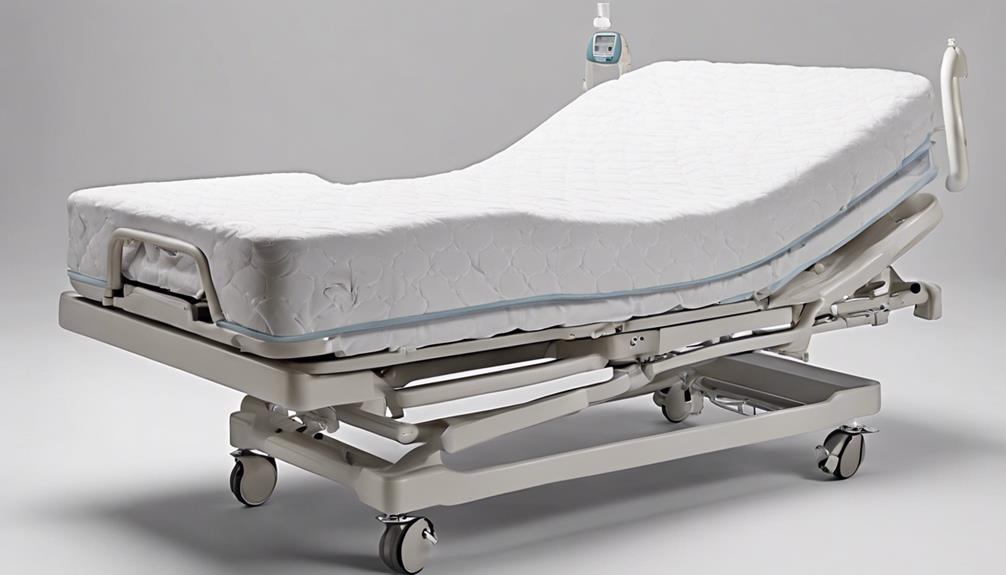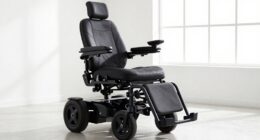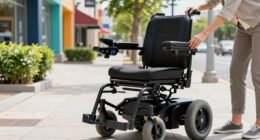Are you finding it challenging to manage dementia patients who exhibit aggressive behavior?
Well, fret not, for there are strategies that can help you navigate these situations with care and patience.
From establishing routines to exploring alternative therapies, the key lies in understanding and adapting to the needs of these individuals.
By incorporating effective communication methods and creating a supportive environment, you can make a significant difference in managing aggression in dementia patients.
Stay tuned to discover the 7 best ways to handle these complex yet rewarding caregiving scenarios.
Key Takeaways
- Tailor care plans to individual abilities to manage aggression effectively.
- Use gentle communication and validation to de-escalate aggressive behavior.
- Implement calming techniques like deep breathing and sensory stimulation.
- Create a supportive, calming environment to reduce stress and aggression.
Understanding Aggression in Dementia Patients
Understanding aggression in dementia patients is crucial for providing effective care and support in managing challenging behaviors. Aggressive behavior is a common symptom in approximately 35% of dementia patients, especially those with Alzheimer’s disease. It’s essential to recognize that triggers such as health issues, discomfort, pain, fear, or frustration can lead to outbursts of aggression.
Dementia patients may exhibit aggression due to the loss of communication abilities, using such behaviors as a way to express confusion or disorientation. When developing individualized care plans, it’s paramount to focus on the remaining abilities and strengths of each patient to effectively manage their aggression. By tailoring interventions to address specific triggers and communication challenges, caregivers can create a supportive environment that minimizes instances of aggressive behavior.
Through patience, empathy, and a deep understanding of the complexities of dementia, caregivers can enhance the quality of care provided to those experiencing aggression in the context of their condition.
Communication Strategies for De-escalation

To effectively de-escalate aggressive behavior in dementia patients, employing calm and reassuring communication techniques is essential. When communicating with dementia patients exhibiting aggression, it’s crucial to maintain a gentle and soothing tone. Validating their emotions and feelings can help establish a sense of understanding and may aid in calming them down.
Redirecting attention to positive activities or memories can shift their focus away from the aggressive behavior. If the situation escalates and becomes challenging to manage, don’t hesitate to seek assistance from trained professionals who have experience in handling aggressive episodes in dementia patients.
Clear communication with healthcare providers is also vital to ensure that the patient receives the necessary support and treatment. Remember, patience and empathy are key when interacting with dementia patients, especially during moments of heightened aggression. By utilizing effective communication strategies, you can help create a more peaceful and comfortable environment for the individual.
Implementing Calming Techniques
When faced with aggressive behavior from dementia patients, remember to take a deep breath and focus on redirecting their attention positively.
Offering gentle touch and playing soothing music can help create a calming atmosphere.
Providing sensory stimulation and validating their emotions can also go a long way in managing aggression effectively.
Breathing Exercises for Calming
Implementing calming techniques with breathing exercises is crucial for effectively managing aggression in dementia patients. Breathing exercises play a significant role in calming individuals with dementia, reducing stress and anxiety levels while enhancing emotional regulation. Deep breathing promotes relaxation and improves oxygen flow, aiding in maintaining a sense of calmness and decreasing physical tension. By encouraging slow, deep breaths, caregivers can support dementia patients in finding moments of tranquility amidst emotional turmoil. Controlled breathing techniques, integrated into daily routines, can be powerful tools in managing aggression. Consistent practice of breathing exercises not only helps in coping with challenging behaviors but also fosters emotional well-being in dementia patients.
| Benefits of Breathing Exercises | |
|---|---|
| Reduces stress and anxiety levels | Promotes emotional regulation |
| Enhances relaxation and oxygen flow | Aids in managing aggression effectively |
Redirecting Attention Positively
Engaging dementia patients in calming activities like music or gentle exercise can effectively redirect their attention and help de-escalate aggressive behavior. When dealing with aggressive behaviors or verbal aggression, swiftly transitioning the individual to engaging activities can be beneficial.
Look for signs of physical discomfort that may be triggering the behavior and try introducing sensory stimulation or a familiar hobby to shift their focus. Implementing calming techniques promptly is key to preventing the escalation of aggressive episodes.
Approach the situation with a soothing tone and gentle touch, guiding the individual towards more positive interactions. By redirecting their attention positively, you can create a calming environment that promotes a sense of security and comfort for dementia patients in distress.
Creating a Supportive Environment

Creating a calming environment is key to supporting aggressive dementia patients and minimizing distress. A serene atmosphere plays a vital role in reducing aggression by eliminating stressors and distractions.
Consider playing soothing music to positively influence their mood and foster a sense of tranquility. Removing environmental distractions can help pacify aggressive behaviors and establish a supportive setting.
It’s essential to prioritize physical safety at all times and promptly seek assistance when managing aggression. In challenging situations, don’t hesitate to call for help from trained professionals to safely de-escalate any confrontations.
Reducing Triggers and Stressors

To help alleviate aggression in dementia patients, it’s crucial to identify and address triggers and stressors that may be causing distress. Here are some essential strategies to help reduce triggers and stressors for aggressive dementia patients:
- Identifying Triggers: Pain, discomfort, fear, and frustration can lead to aggressive behavior in dementia patients. Recognizing and addressing these triggers is vital in managing aggression effectively.
- Environmental Factors: Noise, clutter, and overstimulation can act as stressors for individuals with dementia, increasing the likelihood of aggressive outbursts. Creating a calm and organized environment can help minimize these factors.
- Calming Strategies: Implementing soothing activities, music therapy, and establishing a structured routine can aid in managing aggression and promoting a sense of comfort and security.
Seeking Professional Guidance and Support

When facing the challenges of aggressive behavior in dementia patients, it’s crucial to consult with experts who specialize in dementia care to receive personalized strategies.
Accessing caregiver resources and attending support groups can provide you with much-needed guidance and emotional support on this difficult journey.
Consult With Experts
Seeking guidance from experts in geriatric psychiatry can provide invaluable specialized knowledge in effectively managing aggression in dementia patients.
When dealing with aggressive behaviors in dementia patients, consulting with professionals at memory care facilities can offer tailored strategies for better outcomes.
Expert advice can help caregivers understand the root causes of aggression and develop effective intervention plans, ensuring a safer environment for both the patients and caregivers.
Remember, professionals in dementia care can recommend appropriate non-drug therapies to address aggression in patients, leading to improved quality of life.
Consider reaching out to specialists like Dr. Stephanie Collier for enhanced skills in handling aggressive dementia patients.
Your commitment to seeking expert guidance shows your dedication to providing the best care possible.
Access Caregiver Resources
Consider connecting with healthcare providers, dementia care specialists, or geriatric psychiatrists for valuable guidance on managing aggression in dementia patients. Joining support groups can provide a space for sharing experiences and gaining insights into handling aggressive behaviors.
Seeking counseling or therapy can help you cope with the emotional challenges of caring for aggressive dementia patients. Collaborating with memory care facilities or dementia-specific care providers will give you access to professional guidance and support in managing aggression effectively.
Engaging in ongoing education and training on dementia care techniques is essential to enhance your skills in dealing with aggressive behaviors. By utilizing these caregiver resources, you can better support both the dementia patient and yourself in navigating the complexities of aggressive behaviors associated with dementia care.
Attend Support Groups
Connect with like-minded caregivers in support groups to gather invaluable insights and receive professional guidance on managing aggression in dementia patients. Support groups offer a wealth of resources for caregivers facing similar challenges, providing strategies, coping mechanisms, and emotional support tailored to your needs.
By attending these groups, you can build a sense of community, reduce feelings of isolation, and gain practical advice from professionals in the field. The shared experiences within support groups can help you learn effective communication techniques, access additional resources, and develop resilience in handling aggressive behaviors exhibited by dementia patients.
Take advantage of these opportunities to enhance your caregiving journey and find the support you need.
Self-care Tips for Caregivers

Taking care of yourself as a caregiver is essential for maintaining your well-being while caring for dementia patients. Caregivers often experience high levels of stress and burnout, making self-care crucial. Engaging in activities like exercise, meditation, or hobbies can help you manage stress effectively. Seeking support from other caregivers, attending support groups, or seeking counseling can provide valuable emotional support and prevent feelings of isolation. Remember, taking breaks, setting boundaries, and prioritizing your personal needs are not selfish acts but necessary for maintaining your well-being in order to provide the best care for your loved one.
| Self-Care Tips | Description |
|---|---|
| Engage in activities | Exercise, meditation, hobbies |
| Seek emotional support | Other caregivers, support groups, counseling |
| Set boundaries | Take breaks, prioritize personal needs, establish limits in caregiving responsibilities |
Frequently Asked Questions
How Do You Calm Down an Aggressive Dementia Patient?
To calm down an aggressive dementia patient, you should prioritize safety and remain composed. Validate their feelings, redirect attention positively, and speak in a calm, reassuring manner.
If needed, call for help and ensure the environment is safe. Avoid escalating the situation by removing yourself if necessary. Show understanding and empathy to de-escalate the aggression effectively and promote a sense of security for the patient and those around them.
What Stage of Dementia Is Anger and Aggression?
As dementia progresses, anger and aggression can manifest at any stage. Initially, mild irritability may be present in the early stages, which can intensify as the disease advances. Factors like confusion, fear, pain, or unmet needs can trigger aggressive behaviors.
Verbal communication challenges as dementia worsens may lead to increased emotional dysregulation. Understanding these underlying causes is crucial for effective care and management throughout the various stages of dementia.
At What Point Should Someone With Dementia Not Live Alone?
When dementia progresses to a point where safety is a concern, living alone may not be safe for you. Signs like forgetting tasks, wandering, or being unable to manage daily activities indicate a need for supervision.
Consider a caregiver, assisted living, or living with family for better support. It’s crucial to prioritize your safety and well-being as dementia advances.
What Not to Say to Dementia Patients?
When talking to dementia patients, avoid correcting memories, rushing them, or using harsh language that can provoke aggression. Instead, focus on clear, simple communication, patience, and a gentle approach. Show respect and understanding, steering clear of patronizing tones.
Conclusion
Remember, when dealing with aggressive dementia patients, patience and understanding are key.
Just like a gentle breeze can calm the stormy seas, your compassionate approach can help soothe their agitation.
By implementing the strategies outlined in this article and seeking support when needed, you can navigate the challenges of caring for someone with dementia.
Your dedication and care make a world of difference in their quality of life.
Keep shining your light of love and kindness.









